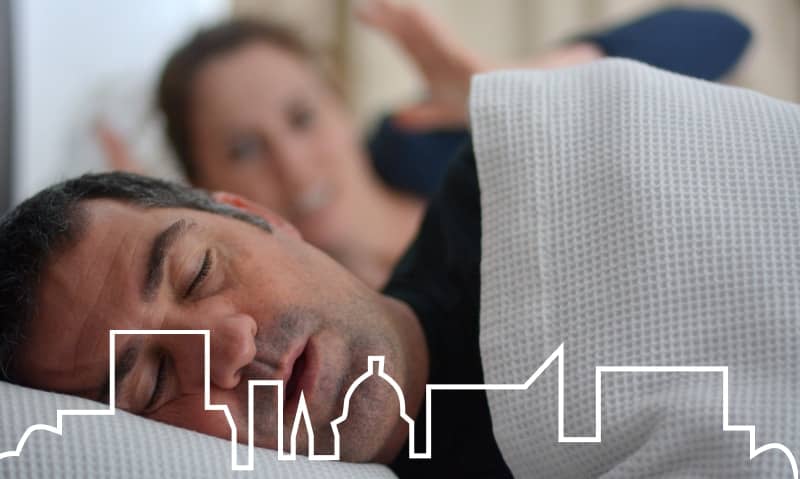Snoring? Sleep Apnea Is a Hidden Killer

It seems like sleep apnea is one of those ailments that people don’t talk about. And if you have never been diagnosed with it, then why worry yourself, right? Well, if you aren’t waking up refreshed despite giving yourself the opportunity for seven to nine hours of sleep per night, if you wake up with headaches, or if your bed partner says you snore, there is a chance that you are suffering from this condition. And sleep apnea is no laughing matter. In fact, it is a hidden killer.
Those who suffer from sleep apnea stop breathing in their sleep.
That may seem a bit extreme, but it’s true. And sleep apnea is more common than you may realize, with an estimated 22 million American adults suffering from it. But what’s worse is that nearly 80% of those with moderate or severe form of this condition remain undiagnosed. But what exactly is this condition? It occurs when your body stops breathing and restarts several times throughout the night while you are sleeping. When this happens, your body doesn’t get the oxygen it needs. And unfortunately, this can be deadly.
Sleep apnea can lead to death as a person’s breathing becomes infrequent enough to create immediate tissue ischemia. This means tissue death from a lack of oxygen in the heart or brain, which can result in a fatal heart attack or stroke. But a heart attack or stroke isn’t the only thing that can cause you to die from this condition. When you are sleep deprived, your brain isn’t working at full capacity. You can feel run-down, and that means you might not be capable of making well-thought-out decisions. So things like driving a motor vehicle or even cooking in your kitchen can become dangerous activities.
And though the intention here is not to scare our patients, we do want to provide a reality check. If you are experiencing some of the following signs and symptoms of sleep apnea, it is time to see a medical or dental professional for help before it is too late.
Common signs and symptoms
If you have one or more of the following symptoms and just don’t feel refreshed when you wake up in the morning, it is time to pay a visit to your physician or dentist near Boise, Idaho, for help. Check out this list of nine common indicators that you may be suffering from sleep apnea.
- Loud snoring
- Intermittent breathing
- Dry or sore throat
- Shortness of breath upon waking
- Irritability
- Restlessness in bed
- Daytime sleepiness
- Morning headache
- Frequent nighttime urination
You may be at risk for sleep apnea.
Of course, by this time, you are likely wondering who is at risk for sleep apnea. We’re glad you asked. Understanding the risk factors and signs of this condition can make all the difference in helping discover your diagnosis and setting you on a treatment plan so that your condition can be controlled or, even better, become a thing of the past. If you have one or more of the following factors, you are at greater risk of developing obstructive sleep apnea.
- Obesity (BMI > 30.0)
- Age 60 or older
- Family history of sleep apnea
- Male (Males are more likely to develop this condition than females.)
- Small airways or a physical misalignment in your nose, throat, or upper airway
- Seasonal allergies
- Enlarged tonsils
- Tobacco use
- Diabetic or a history of stroke or heart failure
Sleep apnea can manifest into other even more severe and deadly health conditions when left untreated. This condition is commonly associated with health concerns such as diabetes, hypertension, stroke, arrhythmia, cardiomyopathy, heart failure, heart attack, and obesity. Sleep apnea can lead to arrhythmia and heart failure, as people with this condition tend to have higher blood pressure. And according to the American Heart Association (AHA) Journals, about 40% to 80% of patients suffering from heart failure or atrial fibrillation also have sleep apnea. This happens because this condition can cause repeated episodes of low oxygen and changes in carbon dioxide levels. Further, sleep apnea can lead to increased inflammation directly affecting the heart.
This condition can be treated.
Thankfully, there is hope for sleep apnea sufferers. In most situations, your physician will prescribe a CPAP (continuous positive airway pressure) machine for you. The CPAP has become an increasingly popular and wildly successful treatment as it pushes a steady stream of air through a mask that patients wear while they sleep. CPAPs effectively keep the airway open, helping you snore less and get a better night’s sleep. Your bed partner will likely get a better night’s sleep too.
On occasion, however, a patient will complain to their dentist that the CPAP machine is too noisy or uncomfortable. While they may be sleeping better, they just aren’t sleeping with the level of comfort that they desire. In these cases, a dentist may recommend a special sleep apnea appliance. During your consultation with your favorite dentist near Boise, Idaho, your provider will determine which type of appliance will work best for your needs. And before long, you’ll be on your way to a better sleep without the fears of this condition’s alarming and concerning outcomes.
Don’t let sleep apnea be a silent killer. Seek help from Staley Dental.
There is no need to sleep in fear any longer. If you want to get a better night’s sleep, now is the time to request an appointment with Staley Dental, your dentist near Boise, Idaho. We’ll start with a consultation to understand your concerns, and if a sleep specialist confirms a sleep apnea diagnosis, we’ll then partner with you to get you on the path to better sleep. We look forward to seeing you!